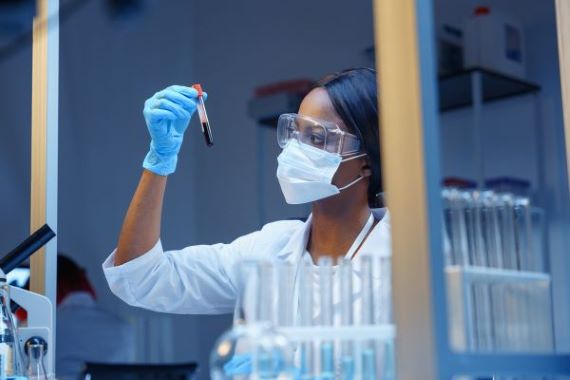Technical standards for admission are defined as “physical, cognitive and behavioral abilities required for satisfactory completion of all aspects of the curriculum and for entry into the profession.”
The technical standards for admission establish the expectations and abilities considered essential for students admitted to the Molecular Diagnostics and Precision Medicine program in order to achieve the level of competency required for graduation and competency to practice Molecular Diagnostics and Precision Medicine.
Applicants to the program must possess independent ability, aptitude and skills in the following areas – observation, communication, critical reasoning, motor and sensory functions and behavioral and social attributes – as outlined below. It is expected that students also have sufficient computer skills and are comfortable with electronic communication and media to successfully and professionally function with a Master of Molecular Diagnostics and Precision Medicine.
Observation skills technical standard
Demonstrate sufficient attention and proficiency in observation skills (visual, auditory and tactile) in the lecture hall, laboratory and clinical rotations and setting.
Indicators include but are not limited to the following examples:
- Accurate observation and participation in the lecture hall and the laboratory and during clinical rotations at affiliated hospitals and other clinical settings.
- Accurate identification of tissue in frozen and fixed surgical specimens.
- Accurate identification of appropriate staining qualities and immunohistochemical detection protocols.
- Accurate visualization and discrimination of text, numbers, patterns, graphic illustrations and findings in academic and clinical settings.
Communication skills technical standard
Demonstrate effective verbal and non-verbal communication skills with other students, faculty, pathologists, and other healthcare providers from different social backgrounds, cultural backgrounds and varying personalities.
Indicators include but are not limited to the following examples:
- Clear, efficient and intelligible articulation of English language.
- Legible, efficient and intelligible written English language.
- Ability to prepare and communicate concise oral and written summaries of protocols and procedural steps for slide preparations from specimens.
- Ability to provide appropriate descriptions of histological findings.
- Record laboratory procedures and provide clear, accurate and precise descriptions of routine histological procedures.
Critical reasoning skills technical standard
Demonstrate critical reasoning skills required to undertake the full curriculum, achieve the level of competency required by the faculty and meet the demands of a fully competent Histotechnologist. These skills include, but are not limited to, intellectual, conceptual, integrative, and quantitative abilities.
Indicators include, but are not limited to, these examples:
- Accurate and efficient reading skills (English language).
- Demonstrate ability to measure, calculate, reason, analyze, integrate and synthesize information.
- Comprehend the spatial relationships of structures (e.g. three-dimensional relationships)
- Demonstrate ability to acquire, retain, assimilate and apply large amounts of complex, technical and detailed general medical, specific pathological, histological and non-medical information.
- Demonstrate ability to synthesize and apply concepts and information from various disciplines in order to deliver appropriate technical support.
- Demonstrate appropriate judgment in processing of cases, including planning, time management, extraction of critical information from review of staining protocols and use of resources to obtain relevant information.
Motor and sensory function technical standard
Demonstrate sufficient motor and sensory function to perform typical functions of a Histotechnologist, including, but not limited to, physical examinations of autopsies, assessment of surgical pathology specimens, tissue preparation and fixation techniques and general functions that pertain to a career as a Histotechnologist.
Indicators include but are not limited to the following examples:
- Functional and sufficient sensory capacity (visual, auditory and tactile) to adequately perform a complete physical examination of slide preparationi results and elecit information gained from proper use of procedural protocols and maneuvers.
- Execute fine and gross motor movements with sufficient coordination, postural control, equilibrium and hand-eye coordination to safely participate in laboratory sessions, use standard medical/laboratory instruments, provide appropriate summary and findings and participate in performing basic and advanced histological and cytological procedures.
- Execute motor movements that demonstrate safety and efficiency in the various learning settings (i.e., classroom, laboratories and clinical rotations, including appropriate negotiation of self in various clinical support environments).
- Physical stamina sufficient to complete the rigorous course of didactic and clinical study, which may include prolonged periods of sitting, standing and/or rapid ambulation.
- Coordination of motor skills necessary to respond to “on-call” emergency situations quickly and appropriately as may be needed for the medical or Allied-Health discipline.
Behavioral and social attributes technical standard
Demonstrate the behavioral and social attributes vital to participation in a professional program and service to practice Molecular Diagnostics and Precision Medicine.
Indicators include but are not limited to the following examples:
- Possess personal qualities that facilitate effective peer interactions (e.g., compassion, empathy, integrity, honesty, benevolence, confidentiality).
- Possess the emotional health required for full utilization of mental faculties (including judgment, orientation, affect and cognition).
- Ability to establish rapport and develop mature and effective professional relationships with faculty, professional peers, the public and other members of the medical profession team.
- Demonstrate impartial motives, attitudes and values in roles, functions and relationships. Communicate and interact with, in a non-judgmental way, persons who differ from oneself and one’s beliefs in a variety of ways, including but not limited to gender, age, race, ethnicity, socio-economic status, culture, creed, military status, sexual orientation and identity and religious or spiritual beliefs.
- Ability to monitor and react appropriately to one’s own emotional needs and responses.
- Display appropriate flexibility, adaptability, composure and emotional stability during periods of high stress or uncertainty associated with didactic and clinical encounters and environments.
- Ability to accurately follow oral and written directions with prompt completion of all responsibilities in the classroom and clinical setting.
- Compliance with standards, policies and practices set forth in the program handbook.
These standards will serve as prerequisites for entrance, continuation, promotion and graduation from the Molecular Diagnostics and Precision Medicine program. Students and applicants must be prepared to meet the technical standards, with or without reasonable accommodation, to complete the program and indicate possession of such ability prior to their matriculation into the program and during registration for each semester.
Note that the use of an intermediary (a person trained to perform essential skills on behalf of the student) is not permitted.
We must maintain the integrity of the curriculum and preserve the essential elements of histotechnologist education. This commitment ensures we do not compromise the health and safety of students or health officials.
Inquiry by the program faculty and staff regarding disability is strictly prohibited. The Master of Molecular Diagnostics and Precision Medicine Program, in accordance with the policy and as delineated by federal and Virginia law, does not discriminate in admissions, educational programs or employment against any individual on the basis of that individual’s disability and will make good faith efforts at providing reasonable accommodation as required. However the program reserves the right not to admit or register students who cannot meet the technical standards or who would constitute a direct threat to the health and safety or others.
Applicants or students who may have questions regarding these technical standards or who believe they may need to request reasonable accommodation in order to meet the standards are encouraged to contact the Disability Officer by email at studentdisability@evms.edu or by phone at 757.446.7261.
Revealing a disability is voluntary; however, such disclosure is necessary before any accommodations may be made in the learning environment or in the program's procedures. Information regarding disabilities is handled in a confidential manner.

